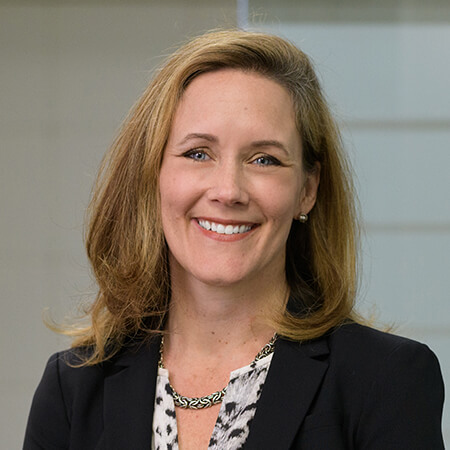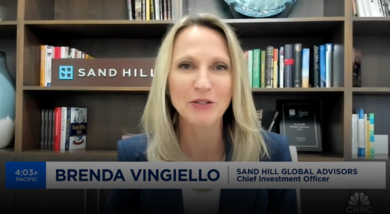Brenda Vingiello, Sand Hill's Chief Investment Officer, joined the Halftime Report to discuss the software space. This content was produced and provided by an unaffiliated

The Psychology of Wealth and Complex Family Dynamics
August 6, 2020
Below is a transcript of the video interview.
Sara Craven:
Welcome everyone to another episode of the Sand Hill interview series, where we discuss the science and art of navigating complex wealth. In this series, we speak with subject matter experts and thought leaders around all things pertaining to managing and dealing with complex wealth situations.
I am Sara Craven, Chief Wealth Manager at Sand Hill. In today’s episode, I’ll be interviewing Marlis and Kjartan Jansen, founders of Graddha. Graddha is a Wealth Dynamics Consulting Firm that works with individuals, couples, families, and family offices to leverage wealth as a tool for human connection, empowerment, and creativity.
Sara Craven:
Marlis is a licensed psychotherapist who is trained in wealth psychology and a sixth generation member of a family of stewardship. This combination of professional training and life experiences gives her a unique perspective around the nuances and complexities of owning financial wealth. Marlis holds a Bachelor of Arts in anthropology from Harvard University and a Master of Arts in psychology from the California Institute of Integral Studies. She also holds a graduate certificate in financial psychology and behavioral finance from Creighton University, Higher School of Business.
Sara Craven:
Kjartan brings to Graddha a combination of financial acumen and personal experience. With almost two decades of experience in the field, he is committed to normalizing finance for clients. Kjartan holds a bachelor’s degree in economics from the University of Bergen in Norway and a master’s degree in applied economics from the University of Michigan. Kjartan also is a CFA charterholder.
Sara Craven:
Before we get started on our interview, I want to share that below you will find more background on these exceptional experts, including a link to have a private conversation with them about you or your clients. So let’s get started.
Sara Craven:
Marlis and Kjartan, welcome to our show! It’s great to have you. Thank you for joining us. So first of all, tell us the genesis behind starting Graddha and what sensitivities and complexities you are really seeking to navigate in your work.
Marlis Jansen:
Sure. So as you referred to earlier, Sara, I grew up in a family of stewardship. We had a family office, and I grew up in the Bay area here. While there were people around me that had more than I did, and people around me that had less, I was not part of the management of the family office. That was something I just didn’t partake in and didn’t have a lot of mentorship in. When I became an adult, I found myself not able to effectively manage my own personal finances.
Marlis Jansen:
Money and wealth wasn’t something that we really discussed in our family. I found myself in a situation that I realized I really wouldn’t want anybody else to be in. I know there are a lot of people in that situation. In my first job out of college, I worked in 10 years into that.
Marlis Jansen:
I worked in the healthcare industry where we were designing healthcare information services for people to help them make healthcare decisions. I realized that people don’t make decisions based on data. They make decisions based on intangibles, like whether they trust their doctor, or whether they feel heard. When there’s a decision that’s very, very important around somebody’s well being, they don’t use data as a primary influencer of their decision making. I became very interested in how people make decisions. I went to psychology grad school and realized that I really wanted to deconstruct a little bit more around how we help people make money decisions and what influences them.
Marlis Jansen:
In my own family, I had seen family dynamics that had long-term ramifications for family relationships and wanted to see what I could do to help people become more agile around wealth and wealth decisions. So let’s see. What are some of the dynamics, you ask? Family dynamics around wealth are complicated. I addressed that a little bit in my own background. We recently talked to somebody who called talking about money the “non-versation.” It was just something that they wanted to try to get more skilled at: managing the “non-versation.”
Marlis Jansen:
Inheritors need guidance. Mentorship should happen early and often. In a lot of cases, it doesn’t. Financial literacy is taught, but the actual increase in use of those financial skills doesn’t go up much. There’s actually research around that. Then, the clear articulation of purpose and values in the family really helps to motivate cohesion. That’s on the family dynamic side: inheritors needing guidance. Sorry, I got distracted a little bit there.
Marlis Jansen:
Successful families adapt and change through the generations. They need to be able to do that. Wealth doesn’t last forever. People need to be able to bring in creativity and generativity. In families that stay cohesive and together, they work that into their identity. That’s when families talk about purpose and values and staying together, it’s not in the interest of one simple business or even a business at all necessarily.
Marlis Jansen:
Then, stewardship is a practice. We talk about elevating ownership to stewardship. Owning wealth is one thing, but stewarding wealth for the future and allocating it toward future generations is another. It is a practice that requires commitment, action, and mentorship. Each of these issues is very deep and multifaceted. It’s our goal at Graddha to break them down into accessible and actionable pieces because they seem like really big things that are hard to grasp. What we try to do is take our clients through processes to help them break them down and understand them for themselves on a deeper level.
Sara Craven:
You’ve touched on some remarkable things here that we see in a lot of our regular work. You have the interconnectedness of family, family dynamics, relationships, and needing to make decisions. Oftentimes, you’re making decisions as a family, but more importantly (and I think that you really explore this in your work) is that everyone comes with a different belief or perception about wealth. They can see it as an opportunity or some maybe even see it as a responsibility. You’ve touched on all of those points in the context of the work that you do. Can you talk with us a little bit more about what your process is when you’re meeting with either an individual, family, or couple?
Marlis Jansen:
Yeah, let’s see. So each client is unique. With that said, we do have a process that we use to help a client assess where they want to go. We start out with a discovery process, and in that discovery process, we find out what the client’s interested in, where they are now, where they’d like to go, and where the gaps are. That is just the first step. It’s usually three to six months with a client on that depending on the complexity. Then we take the work into three realms. We talk about the personal realm. How does a person relate to their wealth? What do they consider to be their wealth identity? In the case, I know we’re going to talk about first generation wealth creators a little bit later, but in the case of a wealth creator, they’re taking on a new identity.
Marlis Jansen:
So the personal aspect of the work is super important. We talk about it on a family or community level: what do they share? It doesn’t have to be a family, right? But if they’re working within the context of a community, how does it apply to them on a group level? Then, we call it structural, but it’s really about seeing what they are putting in place to support the purpose, values, and goals that they aspire to express. The structure of the level can look like trusts, or it can look like ensuring that their purpose and goals are integrated into their financial planning process. It can even go into tax, and definitely into an estate. We look at personal family and structural. Then if it’s a family office, we’re aligning the team and the work of the family office team with the purpose of the family. We do family office work when we can make sure that we know what they’re trying to achieve for their family clients.
Kjartan Jansen:
Adding to what Marlis said, there’s often a fair bit of governance work as well that we will help the family go through. We like to say, focus on the business of being a family rather than what often is a family of business, and then treat it as equally important.
Sara Craven:
Yeah, I’m sure. I’m sure that when getting into the generations, the earlier generations don’t want to assume that the younger generations carry those same values that the family may share in terms of wealth and wealth creation. That joint conversation becomes very important. I imagine, Kjartan, to your comment about it being a family business, you probably are greatly informed by the work that you have done in your own family office and family foundation. You draw from that experience, I’m sure.
Kjartan Jansen:
Yes. For sure. Marlis, do you want to give a little background there?
Marlis Jansen:
Yeah. So in terms of my own family office, I wasn’t involved in the family office from the beginning. I got involved on the philanthropic side. When I was in my mid 20s, I was asked by my father to take some leadership in this family. I didn’t know what that meant, because I hadn’t been involved. What I have observed through all of the experience on the philanthropic side, and then just watching the family office and the splits, (there were several splits actually within one generation: offices would split and form other family offices) is that the family office is really an extension of the family system. The decision around who gets a seat at the table has a great effect on the way the family will be in the way that the rising generation will adopt its wealth identity.
Marlis Jansen:
I also learned what services are offered. There are some family offices that are pretty stripped down investment vehicles, and there are others that offer a variety of services, including private flight, bill pay, or whatever it is. The way that a family office is organized has a very profound impact on the way the families end up being and behaving. Therefore, paying attention to the family office team is really important. Then through the family foundation, I have learned that philanthropy cannot be forced. Philanthropy is one way of making impact, but a family with a foundation really has to… Philanthropy has to be very closely connected to a person’s passions and a person’s sense of purpose. That’s one great way to make impact, but it’s only one, and there are a lot of other ways of making impact. We don’t prescribe philanthropy to anyone. We offer guidance if that’s what they want to do, but we don’t prescribe it to anyone.
Kjartan Jansen:
I might add that I’m what we call an outlaw. So full disclosure, Marlis and I are married, and have two daughters, teenage daughters. We’re a family working with families. In my outlaw role, I did take a board seat out of the family office, which has been a terrific experience. I’m finding that it allows me to very quickly grasp the complexity of family offices and understand the complexities of how to manage the zillion different partnerships that all do different things. I think we’re very familiar with these, Sara. I guess it also has given me a language, or a talking language that makes it easy to communicate with family offices, as well as our family couples and individual clients, of course.
Sara Craven:
Terrific. How about difficult decisions? You must really see the family dynamic come to full force when these families are faced with making excruciating decisions. What are your thoughts on how to navigate through some of that process? Hopefully, families have already gone through your consulting work together, but I’m sure many have not and can learn a great deal with how to deal with that.
Marlis Jansen:
You want to take this one?
Kjartan Jansen:
Sure. Well, we do often witness families who try to make important decisions without having first identifying their underlying purpose and values. What we’ll usually recommend is that we start with a workshop to get them together (under non-COVID times in person, whereas today, it’s a little bit different) where they discuss some critical things that they often don’t think they share anymore. It’s been wonderful to see how many families really light up when they discover that they actually share three to five values. They walked around for possibly years thinking that they haven’t shared anything anymore because they held different political persuasions perhaps. One person was a lot more passionate about this than the other. They were focused on their differences.
Kjartan Jansen:
We start by helping them get back together and see what they share. We also will spend some time on communication styles, which is incredibly important, and show how different styles express themselves differently. We often see multiple light bulbs go off like “Oh, that’s why you’re talking in this way” or “That’s why you’re reacting in this way when I say that.”People have such different responses to it. That’s really the starting point. In these conversations, what we do, which is also very powerful, is we make sure that it’s all forward-looking so that we don’t dig up the past. We let them discover that they have a path forward together that they can be excited about. Once you’ve gone through that, having what seemed like a difficult conversation before seems less difficult because it’s not mirrored in the past with “then you did this and you said that, then you remember that time when that person was so horrible, etc.”
Sara Craven:
You are likely uncovering some new respect around that family table. If you are identifying connections between family members that perhaps they hadn’t recognized before, and to really be able to hear each other in a new way, that’s very impactful work.
Sara Craven:
Kjartan, you mentioned COVID-19. In this extraordinary environment that we are now all operating within, if they are, how are your conversations with your clients changing? Other than the operations of having to do Zoom calls?
Kjartan Jansen:
Right? And it’s not just COVID, we’ve had lots of things happen in the last few weeks.
Sara Craven:
Absolutely.
Kjartan Jansen:
There’s the Black Lives Matter events following the events in Minnesota, and people are grappling with the concept of privilege more than ever. It’s become a very loaded word. For those who have it (we find this is a terrific thing), they really want to find a way to be constructive with it, and to have it help their community (however they define their community).
Kjartan Jansen:
It’s also a time, going back to the communication styles, where we see that people are really stressed. When people are stressed, their communication patterns change. It’s an important time to remind people we’ve worked with to look back at the exercises they’ve done and see, “Oh, so my brother is acting in this weird way now. Oh wait, it’s really not that weird because that’s exactly what you should expect when he starts getting stressed.” That helps normalize some of the new behaviors, if you will, that we’re not necessarily used to being as prolonged as they are now. Of course, many families aren’t able to be together when they want to, because they might’ve been in different cities or different parts of the world when this started. It’s different for everyone.
Sara Craven:
Yeah. I imagine not being able to be in the same room together really creates a different kind of stress that adds to that communication and the situation. Interesting.
Marlis Jansen:
I just want to add to that too, people are really questioning the nature of human connection in this time. People are considering, do we pod up together or do we see each other on Zoom? What does that feel like? Their really getting to see from a different perspective the importance of family. Then the other issue that is front and center is mortality with COVID. Like we’re seeing at the height of COVID in New York. What was it, like a thousand people a day dying? I think a lot of our clients have actually come to us and said, “Hey, we need to have some conversations because this is really bringing up our mortality.” It’s been a catalyst for conversations because people are feeling a renewed sense of urgency to explore what family’s really about.
Sara Craven:
It’s a very introspective time and perhaps some re-prioritization of things. Thank you for noting that. I love that. Marlis, you started to talk about generation one families. In the Bay area, certainly. With our work at Sand Hill, we very regularly navigate what we call “sudden wealth.” It could be a liquidity event such an IPO, a merger acquisition, or the sale of a business. Very similar in fact, to someone coming into an inheritance. What are the situations that you see that gen-one family dealing with conceptually around the idea about sudden wealth and how do they become who they are intended to become when they’ve had such a significant event?
Marlis Jansen:
Yeah. Well, we love working with first generation wealth creators because there’s such an opportunity to set a tone for the ensuing generations. A lot of times, some families are playing catch up, like some of our clients are in like generations three and four. They’re trying to pick up pieces from generations past, maybe because they haven’t put things together in a way that’s easy for them. They’re trying to create better relationships in the wake of that.
Marlis Jansen:
When you have a first generation wealth creator, you have such an opportunity to set the tone for the family going forward. I think that… Are you familiar with Jim Grumman’s book…?
Kjartan Jansen:
Strangers in Paradise.
Marlis Jansen:
Strangers in Paradise. Thank you, Kjartan. His paradigm is that creating wealth is like going to a new culture where you don’t know any of the customs. That’s really true. First generation wealth creators didn’t grow up with it and they are learning as they go, and dealing with all of the attitudes and all the things that they grew up with in terms of attitudes about what it means to be rich, or what it means about you if you are.
Marlis Jansen:
There’s a lot of process that they’re navigating unconsciously while they’re still working really hard and trying to give their kids the best life they can give them. It’s a complicated process. When we can bring mindfulness to it, and also a process that is step-wise and actionable for them, it’s not overwhelming,.Then they can often relax and be excited about looking at it. Sometimes, it’s hard to look at it because there’s something shameful about it to begin with.
Sara Craven:
Interesting.
Marlis Jansen:
Yeah, I love it. I love that you asked that question because clearly, if these are your clients, you’re doing everything you can to help them address everything they’re facing, not just their financial situations.
Sara Craven:
Yeah. Thank you for that. We absolutely do. Many come with exactly those intentions in mind for the careful and thoughtful planning work, laying the foundation, and a framework for their family and generations to come. But it’s in the psychology of that wealth that I really see your work being so impactful in helping to, as you say, set the tone. Because I imagine, and I believe you mentioned this, I imagine that it’s in their subconscious to some extent that maybe they recognize what those challenges are and they just can’t grasp or articulate how it is that they’re supposed to be feeling. We navigate those conversations all the time. That’s where our work together, because Sand Hill being a registered investment advisor, we have the investment management and we have the thoughtful, mindful financial planning, but the psychology is where in helping them articulate what wealth means to them for a family is a really big piece of that puzzle.
Sara Craven:
Another thing that is very clear in our work is that no one is immune to the personal and interpersonal concepts around wealth. Have you ever met someone who wasn’t impacted by the extraordinary experience?
Marlis Jansen:
No.
Kjartan Jansen:
No.
Marlis Jansen:
I like to tell the story about how I went to open the first bank account ever for my business and told the guy I needed a business bank account. He said, “Well, what does your business do?” And I told him, he said, “Wait a minute. Can I talk to you? My wife and I, it’s the only thing we fight about.” I thought to myself, well, I just want a bank account. So it was that thing where every time we tell people what we do, it’s like telling someone you’re a doctor. They say, can I show you my scar?
Sara Craven:
Yeah. Yes. It’s everywhere. You’re right. You mentioned with this example in the bank, isn’t that one of the things that’s on the top of the list that couples argue about is money, right? You can really be quite helpful there. It’s very important work.
Sara Craven:
We’ve touched on a lot of concepts today, but we see at Sand Hill in particular, that it is, as we’ve already mentioned, it’s not just about the investment management or the financial planning. We really want to service the whole client and the whole client family. Thank you, Marlis and Kjartan, for our time together today. As a reminder for our audience, click this link for more information. Or if you are a Sand Hill client, and you’d like to have an introduction to Marlis and Kjartan and their amazing work with Graddha, then reach out to your wealth manager and we’ll facilitate an introduction. But see you next time. Thank you, Marlis and Kjartan again.
Kjartan Jansen:
Thank you so much, Sara.
Sara Craven:
Thank you.
Marlis Jansen:
Thank you. It was great. Thank you.
Sara Craven:
Bye bye.
*****
Disclosure: Sand Hill Global Advisors (“SHGA”) is a registered investment adviser with the Securities and Exchange Commission however, such registration does not imply a certain level of skill or training and no inference to the contrary should be made. SHGA may only transact business in the states where the firm is noticed filed or otherwise exempt. For disclosures, including additional information on credential designations of SHGA representatives please see our Form ADV Part 2A and 2B Disclosure Brochures, which can be obtained by clicking here. SHGA is separately owned and unaffiliated with any other firm or entities mentioned or featured in this video. This video presentation may discuss certain investment products and/or securities and is being provided for informational purposes only, and should not be considered, and is not, investment, financial planning, tax or legal advice; nor is it a recommendation to buy or sell any securities. Investing in securities involves varying degrees of risk, and there can be no assurance that any specific investment will be profitable or suitable for a particular client’s financial situation or risk tolerance. Past performance is not a guarantee of future returns. Individual performance results will vary. The opinions expressed in the video reflect SHGA’s views as of the date of the video. Such views are subject to change at any point without notice. You should not treat any opinion expressed by SHGA as a specific inducement to make a particular investment or follow a particular strategy, but only as an expression of general opinion. Nothing presented herein is or is intended to constitute investment advice, and no investment decision should be made based solely on any information provided on this video. There is a risk of loss from an investment in securities, including the risk of loss of principal. SHGA does not guarantee any specific outcome or profit. Any forward-looking statements or forecasts contained in the video are based on assumptions and actual results may vary from any such statements or forecasts. SHGA encourages you to consult with a professional financial advisor prior to making any investment decision.
Articles and Commentary
Information provided in written articles are for informational purposes only and should not be considered investment advice. There is a risk of loss from investments in securities, including the risk of loss of principal. The information contained herein reflects Sand Hill Global Advisors' (“SHGA”) views as of the date of publication. Such views are subject to change at any time without notice due to changes in market or economic conditions and may not necessarily come to pass. SHGA does not provide tax or legal advice. To the extent that any material herein concerns tax or legal matters, such information is not intended to be solely relied upon nor used for the purpose of making tax and/or legal decisions without first seeking independent advice from a tax and/or legal professional. SHGA has obtained the information provided herein from various third party sources believed to be reliable but such information is not guaranteed. Certain links in this site connect to other websites maintained by third parties over whom SHGA has no control. SHGA makes no representations as to the accuracy or any other aspect of information contained in other Web Sites. Any forward looking statements or forecasts are based on assumptions and actual results are expected to vary from any such statements or forecasts. No reliance should be placed on any such statements or forecasts when making any investment decision. SHGA is not responsible for the consequences of any decisions or actions taken as a result of information provided in this presentation and does not warrant or guarantee the accuracy or completeness of this information. No part of this material may be (i) copied, photocopied, or duplicated in any form, by any means, or (ii) redistributed without the prior written consent of SHGA.
Video Presentations
All video presentations discuss certain investment products and/or securities and are being provided for informational purposes only, and should not be considered, and is not, investment, financial planning, tax or legal advice; nor is it a recommendation to buy or sell any securities. Investing in securities involves varying degrees of risk, and there can be no assurance that any specific investment will be profitable or suitable for a particular client’s financial situation or risk tolerance. Past performance is not a guarantee of future returns. Individual performance results will vary. The opinions expressed in the video reflect Sand Hill Global Advisor’s (“SHGA”) or Brenda Vingiello’s (as applicable) views as of the date of the video. Such views are subject to change at any point without notice. Any comments, opinions, or recommendations made by any host or other guest not affiliated with SHGA in this video do not necessarily reflect the views of SHGA, and non-SHGA persons appearing in this video do not fall under the supervisory purview of SHGA. You should not treat any opinion expressed by SHGA or Ms. Vingiello as a specific inducement to make a particular investment or follow a particular strategy, but only as an expression of general opinion. Nothing presented herein is or is intended to constitute investment advice, and no investment decision should be made based solely on any information provided on this video. There is a risk of loss from an investment in securities, including the risk of loss of principal. Neither SHGA nor Ms. Vingiello guarantees any specific outcome or profit. Any forward-looking statements or forecasts contained in the video are based on assumptions and actual results may vary from any such statements or forecasts. SHGA or one of its employees may have a position in the securities discussed and may purchase or sell such securities from time to time. Some of the information in this video has been obtained from third party sources. While SHGA believes such third-party information is reliable, SHGA does not guarantee its accuracy, timeliness or completeness. SHGA encourages you to consult with a professional financial advisor prior to making any investment decision.








